Penn Vet Dual Degrees: The Student Experience
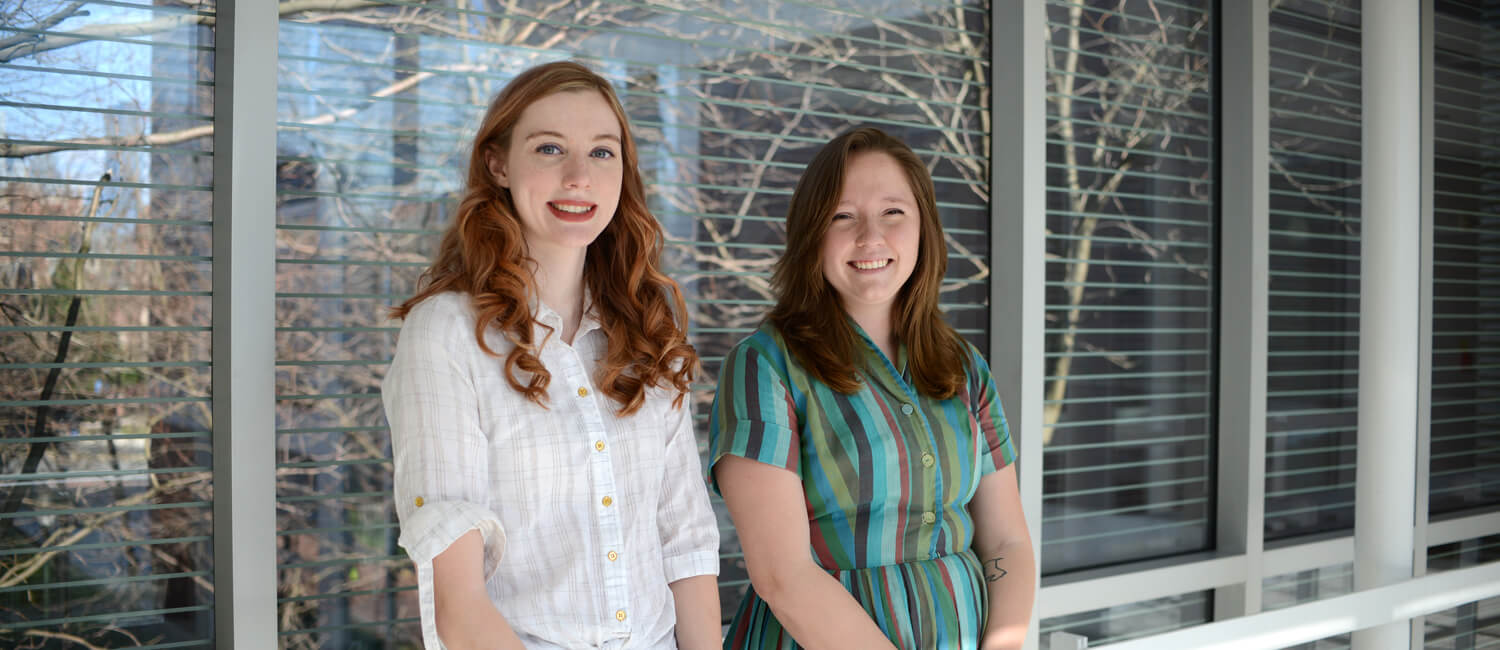
Last year, Penn Vet expanded its dual degree program, adding a VMD-Master of Social Work (VMD-MSW), with Penn’s School of Social Policy & Practice, as well as a VMD-Master of Environmental Studies (VMD-MES), with the University’s School of Arts and Sciences.
The degrees — which feel almost prescient given the recent perfect storm of a pandemic; growing awareness of social, racial and economic inequity; and increased impact of climate change — are the latest additions to the School’s pioneering program. (Penn Vet’s VMD-PhD degree was the first of its kind nationwide.)
“Veterinarians have always played important roles in public health, human health, and welfare. Current events have only underscored the importance of our profession in interprofessional efforts to tackle these complex health challenges,” said Dr. Jennifer Punt, associate dean of One Health and professor of immunology. “These new degrees join the visionary VMD-PhD, VMD-MPH, and VMD-MBA programs and reflect the novel need for veterinarians to engage in interdisciplinary problem solving at the critical juncture of human health, environmental health, and animal health and welfare. Our first cohort of students in these programs are already transforming expectations for the future; we couldn’t be more excited for them and with them.”
Three students — two in the first cohort for the new programs and one in the already established VMD-MPH program — share their experiences as future veterinarians in today’s world.
Anna Shirosky, VMD-MES,’22
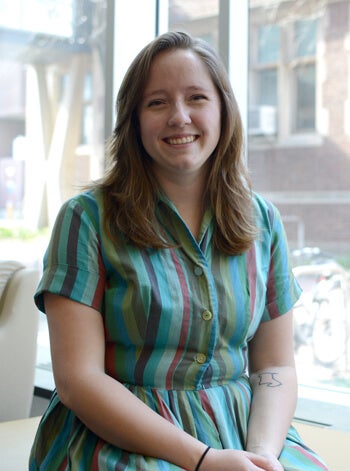 How did you come to study veterinary medicine?
How did you come to study veterinary medicine?
Both of my parents were in human medicine. For a time, I wanted to be a human medicine physician. After an internship at an assisted living facility, I realized I didn’t enjoy working with people as much as I expected to. I then had a job as a vet tech doing veterinary physical therapy. That was when I realized I wanted to go into veterinary medicine — I can do medicine and work with creatures that I love as the primary patient.
In what ways do you believe veterinarians can influence environmental protection?
The COVID-19 pandemic has shown veterinarians are at the center of humans, animals, and the environment – it’s the One Health concept. We must embrace our role in balancing the health of all three. Penn Vet’s dual degree programs are an acknowledgment of our unique position, whether we’re in clinical practice, research, or the private or public sector.
Where do you see yourself going with the degree?
It’s all about the environment for me and fish and fish ecology. I’m interested in areas where humans are impacting wildlife, looking at how that interaction is happening, and understanding what people can do to mitigate its harm. I see myself working with a department of game or wildlife.
What has been surprising for you in your MES classes?
The back and forth between perspectives — seeing issues from many different sides and bringing the veterinary viewpoint to environmental issues and the other way around.
For example, in my environmental studies ornithology class, we talked about trap, neuter, release programs, the veterinary gold standard for animal care and population control. I was really surprised environmentalists have a different view — they often advocate for euthanizing stray cats, so the cats aren’t released back into the wild to kill birds and reptiles. I’d never thought of it this way.
I brought the environmental studies view back to my Penn Vet mentors and classmates and the veterinary perspective to my environmental studies classmates. We didn’t solve the issue but did have a more rigorous debate, informed by both sides.
Jaclyn Camus, V’22, MPH’21
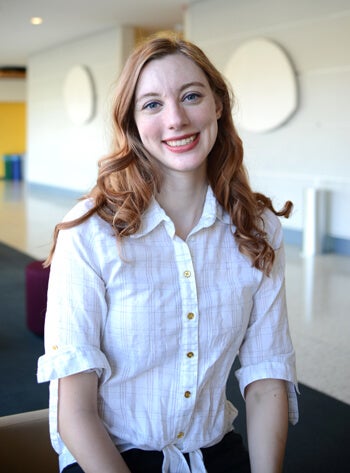 How did you come to study veterinary medicine?
How did you come to study veterinary medicine?
I studied agriculture in undergrad and worked at a wildlife rehab center when there was an E. coli outbreak that spread to humans. I became fascinated with infectious disease, especially disease between exotic species, and learning more about One Health. I felt Penn Vet was putting One Health into action more than anywhere else — which is evident in the dual degree program options.
What is your vision of the veterinarian’s role in public health?
Someone who is “at the table” in all areas of One Health. I’m interested in areas of the public sector where veterinarians are key to surveillance of diseases that impact animals and humans and have a voice in policies and programs related to curbing disease spread. Penn Vet’s Wildlife Futures Program is a great example. For my capstone project, I’m working with the program to figure out disease surveillance models for chronic wasting disease.
What has surprised you about your MPH classes?
I haven’t been really around my classmates in person because we’ve been virtual, so it’s hard gauge the full experience. But one of the surprises so far is around communication and communication skills.
In vet school, we basically only have time to talk to ourselves and the other vets so it’s easy to slip into vet jargon. My public health classmates are medical students, dental students, nursing students, and undergrads. It’s made me very aware of the need to communicate effectively for a broad audience.
I see it too in the Wildlife Futures Program. A major aspect of the work is outreach to the hunting community to educate hunters about certain practices and policies and get them on board. How we communicate these messages is everything!
Where do you see yourself going with the degree?
I want to go into government, maybe working with the Centers for Disease Control or in a state veterinarian office, probably in research.
Caitlyn Tukdarian, V’22, MSW’24
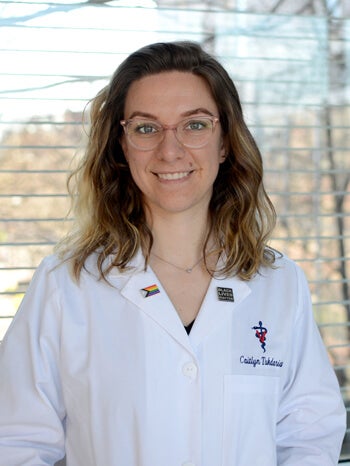 How did you come to study veterinary medicine?
How did you come to study veterinary medicine?
I was a history major and sociology minor in college. After graduation, I had a ‘what’s next?’ period. My sister pointed out that I enjoyed helping deliver puppies for a friend’s dog. She suggested I look into veterinary medicine. After researching the classwork and animal background I’d need, I worked in a therapeutic riding center while completing a pre-vet post bacc. That changed everything for me and here I am today.
For you, how do veterinary medicine and social work intersect?
Veterinary medicine is really a human-centric profession, whether or not we realize it at first. And social work supports the symbiosis between humans and animals. I see the intersection being the respect and support for the life and dignity of animals and the humans who care for them.
I came into Penn Vet with the goal of helping the animals who help people so much. Then when I learned about the VMD-MSW, I realized this is what I was meant to do – help people and animals!
Where do you see yourself going with the degree?
I want to go into equine ambulatory private practice. I shadowed an ambulatory vet and loved that she really got to know the families and their lives. Seeing people and animals in their own environments is a window into what’s going on that you don’t have in a hospital setting. I can help humans and animals all at once. I also want to use my training to expand veterinary medicine into more communities and make care more accessible and equitable for everyone who wants the best for the animals they love.
What has been surprising for you in your MSW classes?
It’s been eye-opening. I took an American Racism in Social Work Practice class. It was the most personally challenging (and necessary) class I’ve ever taken — in the best way possible. We had ongoing interactive journaling exercises that pushed us to confront our personal biases and facts about ourselves we might not have recognized otherwise. I believe anti-racism work that encourages self-reflection is critical to social work and any discipline.
Also, it’s been challenging to shift from more didactic work in the first few years of vet school to more discussion based, theoretical work in social work courses.
An Eye on the Students

Chipo Siantumbu manages the student experience across five dual degrees (with more soon to come). In this role, she gets to know students well while they’re at Penn Vet, often staying in touch after they graduate. We had questions for her too.
What attracts students to pursue a dual degree?
A passion for the areas they’ve selected is first and foremost. They have a strong interest in interdisciplinary learning and want to mesh their ambitions with classwork to achieve their longer-term goals. And an attractive element, but it’s never been a primary driver, is that Penn Vet offers scholarships to all dual degree students. We guarantee 20% of tuition.
How are students managing the workload of two curricula, some of them simultaneous?
We work closely with our partner schools to identify classes or credits that match within the VMD track and cross count them. So, students end up taking fewer courses than they would going after each degree separately. But the workload is intense; passion can only go so far. We provide supports for students and a mentor for each. I’m proud that all of our students have done extremely well in the vet and secondary degree programs.
And we always encourage students to carve out time for rest and self-care – for example, the students in this piece: Jaclyn is a great baker and watches horror movie marathons; Anna catches up on sleep, walks her dog and eats dinner with her boyfriend; and Caitlin loves to read, play golf and volleyball, listen to records, and play the piano. They find time to reset.
What differentiates Penn Vet’s dual degree program from others?
Penn Vet is the vanguard. We were the first and have tested experience designing curricula. And Penn Vet dual degree students benefit from studying under the world’s leading scholars, researchers, and educators from multiple disciplines.
We recently surveyed a host of dual degree students. Of 19, nine said they chose Penn Vet for the dual degrees, so I’d say the degrees differentiate us from other schools.
I must also add that Penn Vet’s Dr. Jenni Punt [associate dean for One Health] is fantastic — she has translated Dean Hoffman’s vision for these programs into compelling opportunities for students. And she is also a great student advocate — she works closely with students to understand what they need.
More from Bellwether

From Bird Fractures to Human Shoulders
As a child in Central Pennsylvania, Stephen Peoples, V’84, loved science and the natural world.
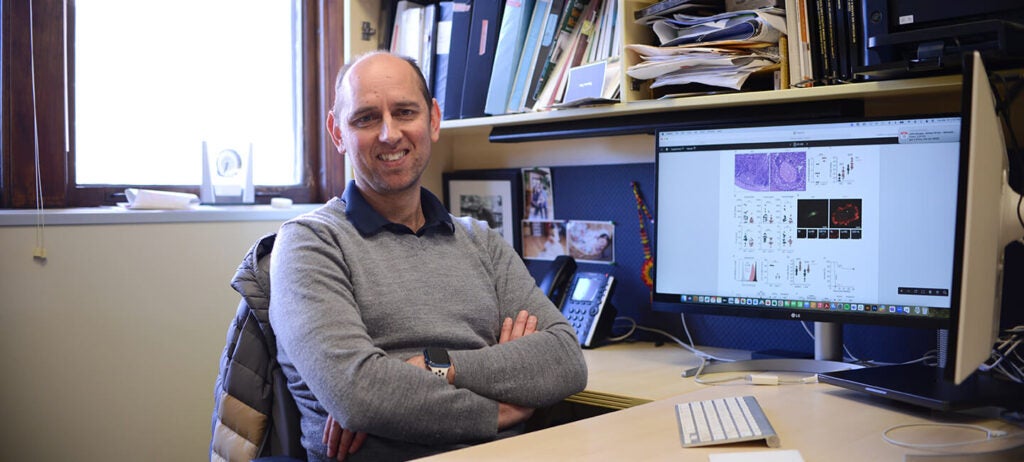
In the Office with Igor Brodsky, PhD
In his Philadelphia-based lab, Igor Brodsky is on a mission to understand how the body recognizes and responds to invading organisms that cause several diseases.
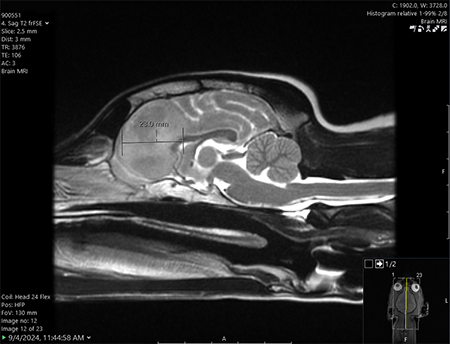
One Tiny Dog’s Outsized Contribution to Brain Surgery
Geddy Lee has lived a big life for a little dog. As a puppy, the tiny terrier mix was abandoned in Mississippi during a high-speed car chase. Rescued by law…
